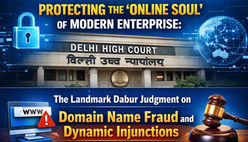ITAT Mumbai rules investors can set off STT-paid losses (15% tax bracket) against non-STT gains (30% tax bracket), providing greater tax optimization flexibility under Section 70(2) of Income Tax Act
- NLF TAX & LEGAL
- May 20, 2025
- 4 min read
The Hon'ble ITAT Mumbai Bench 'I' in Eastspring Investments India Equity Open Ltd. vs. Deputy Commissioner of Income-tax (IT) [IT Appeal No. 1219 (Mum) of 2025] dated May 9, 2025 held that short-term capital loss (on which Securities Transaction Tax was paid) can be set off against short-term capital gain (on which Securities Transaction Tax was not paid).
Facts of the Case
The Petitioner was a Foreign Portfolio Investor in India and was registered with the Securities and Exchange Board of India. For the year under consideration, the Petitioner filed its return of income on October 28, 2022, declaring a total income of Rs. 1309,50,27,488/-. The return filed by the Petitioner was selected for scrutiny, and statutory notices under section 143(2) and section 142(1) were issued and served on the Petitioner.
During the assessment proceedings, the Petitioner provided the breakdown of its capital gains and losses. The Petitioner reported a net short-term capital gains of Rs. 175,26,00,094/- by setting off the amount of short-term capital loss [on which Securities Transaction Tax ("STT") was paid], which was taxable at 15% under section 111A of the Act, against the short-term capital gains (on which STT was not paid), which was taxable at 30% under section 115AD of the Act. Thereafter, the Petitioner set off the balance loss against the short-term capital gains earned on the transaction of sale of shares subjected to STT.
The Assessing Officer held that in the present case, the Petitioner had capital gains which were taxable at 15%, whereas the Petitioner had opted to set off the losses having lower taxability with the gains of higher taxability, which according to the Assessing Officer was not in accordance with the provisions of the Act. Accordingly, the Assessing Officer recomputed the computation of capital gains and made an addition.
The Dispute Resolution Panel upheld the computation of capital gains made by the Assessing Officer. The Petitioner filed an appeal as it was aggrieved by the final assessment order dated December 27, 2024, passed under section 143(3) read with section 144C(3) of the Income Tax Act, 1961, pursuant to the directions dated November 30, 2024 issued by the learned Dispute Resolution Panel-1, Mumbai.
Issue
Whether short-term capital loss (on which STT was paid) can be set off against short-term capital gain (on which STT was not paid)?
Held by the Court
The Hon'ble ITAT Mumbai Bench 'I' in the IT Appeal No. 1219 (Mum) of 2025 held that:
As per the provisions of section 70(2) of the Act, the short-term capital loss can be set off against gain from any other capital asset. Section 70(2) of the Act does not make any further classification between the transactions where STT was paid and the transactions where STT was not paid.
The emphasis of the Assessing Officer on the term "similar computation" only refers to the computation as provided under sections 48 to 55 of the Act.
The Tribunal noted that a similar issue had been decided by the Co-ordinate Bench of the Tribunal in iShares MSCI EM UCITS ETF USD ACC v. Dy. CIT (International Taxation), following the decision of the Hon'ble Calcutta High Court in CIT v. Rungamatee Trexim (P.) Ltd. [IT Appeal number 812 of 2008, dated December 19, 2008], which allowed the set off of short-term capital loss (on which STT was paid) against the short-term capital gains (on which STT was not paid).
The Tribunal also noted similar findings rendered by the Co-ordinate Benches of the Tribunal in favor of the taxpayer in other cases including Emerging Markets Index Non-Lendable Fund v. DCIT, Vanguard Total International Stock Index Fund v. ACIT (IT), JS Capital LLC v. ACIT (International Taxation), and Dy. DIT v. DWS India Equity Fund.
The Tribunal directed the Assessing Officer to accept the methodology adopted by the Petitioner for the computation of the capital gains and to correctly compute the income of the Petitioner and levy the tax as per law.
Relevant Sections
"Section 70(2) of the Income Tax Act, 1961" - Where the result of the computation made for any assessment year under sections 48 to 55 in respect of any short-term capital asset is a loss, the assessee shall be entitled to have the amount of such loss set off against the income, if any, as arrived at under a similar computation made for the assessment year in respect of any other capital asset.
"Section 111A of the Income Tax Act, 1961" - Tax on short-term capital gains in certain cases.
"Section 115AD of the Income Tax Act, 1961" - Tax on income of Foreign Institutional Investors from securities or capital gains arising from their transfer.
Pari Materia / Cases Referred
iShares MSCI EM UCITS ETF USD ACC v. Dy. CIT (International Taxation) - The Co-ordinate Bench allowed the set off of short-term capital loss (on which STT was paid) against the short-term capital gains (on which STT was not paid).
CIT v. Rungamatee Trexim (P.) Ltd. [IT Appeal number 812 of 2008, dated December 19, 2008] - The Hon'ble Calcutta High Court held that there is no provision nor does the act compel the assessee to first set off short-term capital gain with STT against short-term capital loss with STT and then allow set off against short-term capital gain without STT.
Emerging Markets Index Non-Lendable Fund v. DCIT [IT Appeal No. 4589 (Mum) of 2023, dated August 5, 2024] - Similar findings in favor of the taxpayer.
Vanguard Total International Stock Index Fund v. ACIT (IT) [IT Appeal No.4656 (Mum) of 2023, dated December 13, 2024] - Similar findings in favor of the taxpayer.
JS Capital LLC v. ACIT (International Taxation) - Similar findings in favor of the taxpayer.
Dy. DIT v. DWS India Equity Fund [IT Appeal No.5055 (Mum) of 2010, dated April 11, 2012] - Similar findings in favor of the taxpayer.
____________________________________________________
DISCLAIMER: The views expressed are strictly of the author and NLF Tax and Legal Advisory. The contents of this article are solely for informational purposes and for the reader’s personal non-commercial use. It does not constitute professional advice or a recommendation of the firm. Neither the author nor the firm and its affiliates accept any liabilities for any loss or damage of any kind arising out of any information in this article nor for any actions taken in reliance thereon. Further, no portion of our article or newsletter should be used for any purpose(s) unless authorized in writing, and we reserve the legal right for any infringement on usage of our article or newsletter without prior permission

































Comments